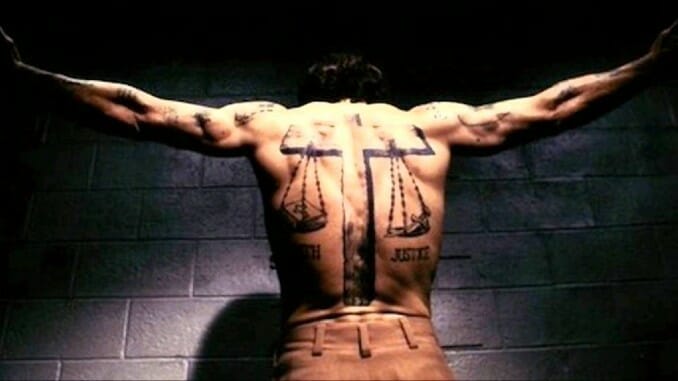How Martin Scorsese’s Cape Fear Subverts the Narrative of Christian Crime and Punishment

Before anything else, Cape Fear is a film about justice. Or, more specifically, it is a film about the critical conflict between corporeal and spiritual justice. A remake of J. Lee Thompson’s 1962 film of the same name, Martin Scorsese’s movie follows a family living in a peaceful town in North Carolina. A wrench is thrown into their quiet lives, however, when Max Cady (Robert De Niro) is released from prison after serving a substantial stint for assault. Max is hellbent on exacting revenge against the man who he believes put him there—lawyer Sam Bowden (Nick Nolte)—who happens to be our wholesome family’s patriarch.
Both films are riveting cat-and-mouse chases, infused with a healthy amount of psychological warfare. But where Scorsese’s version departs from the original is in its avid use of Christian symbolism—a theme which arises in the majority of his films. When we first meet Max, he is adorned with tattoos, a large amount of them relating to Christianity. He has a number of Bible quotes scrawled on his flesh, including a quote from the Gospel of Matthew (“My time is at hand”) and one from Romans (“Vengeance is mine”). And if that didn’t get the point across sufficiently, a bumper sticker on Max’s car reads: “You’re a VIP on Earth. I’m a VIP in heaven.”
Max believes that there has to be a justice system that transcends the courts that failed him. While in prison, he converted to Christianity, believing that, if there is a God, then he’ll do right by Max. But in seeking revenge himself, he ends up positioning himself as a holy figure, acting as though he is the only one suited to differentiate between right and wrong and justly deliver punishment. Max’s post-prison role begs the question: Is exacting justice yourself a Christian endeavor, or the opposite?
In 2 Corinthians, Paul the Apostle considers the question of crime and punishment on a spiritual level. “You yourselves [believers in the Corinth] are our letters,” he explains, “written on our hearts, known and read by everyone. / You show that you are a letter from Christ, the result of our ministry, written not with ink but with the Spirit of the living God, not on tablets of stone but on tablets of human hearts” (2 Cor. 3:2-4). Paul outlines a fixed separation between the physical and spiritual world where crime and punishment is concerned. This passage assumes that the word of God should be inherent in someone’s mind—that it is “written in our hearts”—and therefore, when applied to our Christian antagonist, it is not Max’s place to undertake what he believes to be Sam’s rightful punishment.
But he does anyway. He lurks around the Bowden household and intimidates Sam, and even goes as far as to kill the family dog. But Max’s tactics go beyond just surface-level scares. Max jumpstarts his master plan of punishment with Sam’s naïve teenage daughter, Danielle (Juliette Lewis). He invites her to her school’s theater under the pretense that he’s a teacher, then seduces her and poisons her against her father in a matter of minutes. In doing this, he successfully fractures the family that he is seeking retribution against: Sam is furious when he finds out about his daughter’s relationship with Max, while Danielle has already been cajoled into thinking that her father is a bad guy.
-

-

-

-

-

-

-

-

-

-

-

-

-

-

-

-

-

-

-

-

-

-

-

-

-

-

-

-

-

-

-

-

-

-

-

-

-

-

-

-








































